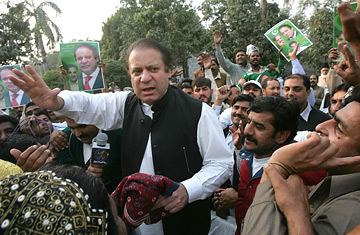
Former Pakistani Prime Minister Nawaz Sharif returns from exile, and registers today as a candidate for Pakistan's crucial elections.
The return of former Prime Minister Nawaz Sharif adds a new twist to the political chess game that has dragged on for the past few months in Pakistan. Sharif, who was ousted by current President General Pervez Musharraf in a bloodless 1999 coup and who left Pakistan for exile after being found guilty of corruption, arrived in Lahore Sunday and was greeted by hundreds of chanting supporters. Government officials said he had been allowed back into the country after reaching an "understanding" with Musharraf. But Sharif said there was no such understanding. He was back, he told the crowd, "to save Pakistan and save democracy."
That's a tall order for any one person. Pakistan has lived with military rule for seven years now. Earlier this month Musharraf imposed what is effectively martial law, forced Supreme Court judges not loyal to him off the bench, and cracked down on independent journalists. Musharraf says he will step down as army chief of staff in the next few days, ahead of being sworn in for a second term as President later this week. He also says the state of emergency will soon be lifted. Parliamentary elections are scheduled for early January but opposition parties, including Sharif's Pakistan Muslim League-Nawaz, and former Prime Minister Benazir Bhutto's Pakistan People's Party, have not yet decided whether they will participate or not.
Both former leaders want the state of emergency lifted immediately and say they cannot take part in the election if it stays. If they boycott, the January poll will be a farce, and will strip away the last veneer of democracy that Musharraf has used to cover his dictatorship. But assuming the state of emergency is lifted and Sharif and Bhutto do compete, the big question becomes whether they can work together to try to wrest control of the parliament from Musharraf and his cronies. Sharif and Bhutto have very little in common other than a mutual dislike of the current President. Historically they have despised each other: Sharif is more conservative, while Bhutto is acceptable in Western capitals. Previous attempts at a united anti-Musharraf front have foundered over who would lead it. And while both Bhutto and Sharif were greeted by cheering throngs on their return from exile, some Pakistanis blame them for the increased corruption and economic mismanagement of the 1990s and lament that their potential democratic saviors are political has-beens who, they argue, both largely failed in office.
Still, a Sharif-Bhutto team would combine the forces of the two biggest parties in the country and create a powerful obstacle to Musharraf's plans to control the next parliament. In the weeks ahead Pakistan's future may hinge on whether two unlikely allies can work together against the one person they despise more than each other.
